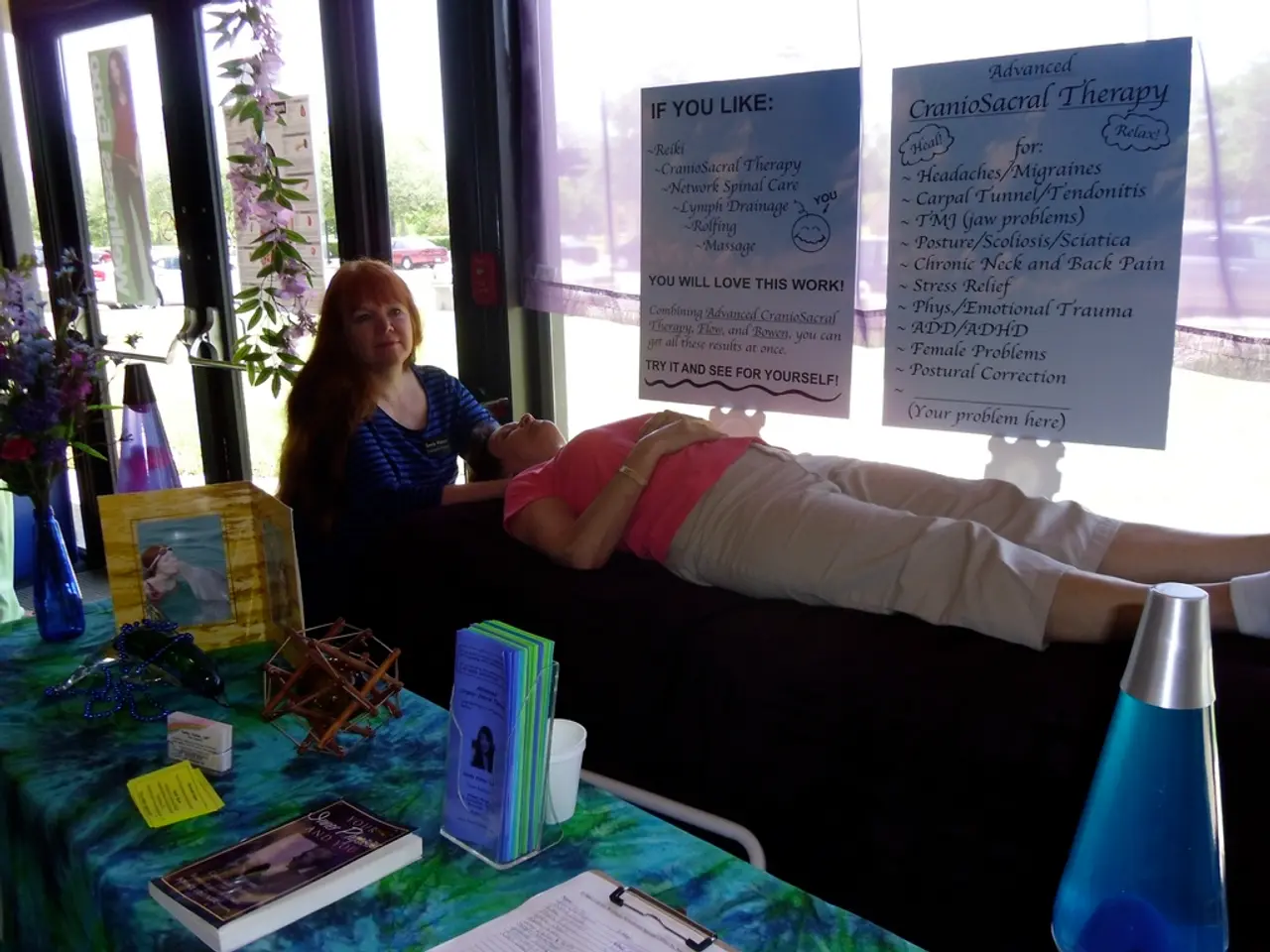Stress and Psoriasis: Exploring their connection and ways to disrupt the pattern
In the ongoing battle against psoriasis, managing stress plays a crucial role in controlling symptoms and improving the quality of life for patients. The American Academy of Dermatology Association advises taking measures to avoid skin injuries, protect against bug bites, and minimise stress at home [1].
Stress can act as a trigger for psoriasis flare-ups, exacerbating the condition, and it can also develop as a result of living with psoriasis. The emotional toll of the condition, including feelings of social isolation, self-esteem issues, and anxiety about showing skin or managing symptoms, can create a vicious cycle where stress worsens the disease, and the disease, in turn, worsens stress [1].
A 2018 review of studies found that anywhere from 10-50% of people living with psoriasis report stress as a trigger for their symptoms [2]. Stress disrupts hormonal and immune system balance, promoting inflammation and overproduction of skin cells, which are characteristic of psoriasis flare-ups [1].
Managing stress effectively is essential for better disease control and reducing psoriasis flare-ups. Approaches include identifying individual stress triggers, avoiding or coping with them through behavioural or psychological strategies [1][2]. Seeking physical and mental health professional support, such as counseling or therapy, is also crucial in managing anxiety and depression [1].
Employing stress management techniques like relaxation exercises, mindfulness, meditation, or regular physical activity can also be beneficial [1][4]. It's important to note that these strategies should be used in conjunction with medical treatments for psoriasis to control symptoms effectively [4].
Psoriasis is a lifelong autoimmune condition without a cure, and while controlling stress can help prevent or lessen the frequency and severity of flares, it may not completely eliminate them [1][4]. Understanding and addressing the emotional toll of psoriasis is key to breaking the cycle of stress and disease worsening [1][5].
Moreover, early-life stress or trauma may increase psoriasis risk through long-term immune dysregulation, highlighting the importance of addressing stress across the lifespan for psoriasis outcomes [3].
In addition to mental health treatment, working with a doctor or healthcare professional to find a suitable treatment plan is essential. This may include prescription and over-the-counter topicals, phototherapy (light therapy), and systemic medications such as biologics and other oral treatments [4].
Experts suggest the neurogenic inflammation hypothesis as a potential explanation for the link between stress and psoriasis [4]. The National Psoriasis Foundation recommends managing stress as part of a treatment plan, including seeking outside help, practicing meditation, and being physically active [4].
It's also important to note that psoriasis is a type of immune-mediated disease where the immune system causes inflammation throughout the body [4]. Avoiding sunburn, as even a mild case can cause new psoriasis or worsening symptoms, is advisable [5].
Psoriasis can affect a person's mental health, causing stress about showing skin, social situations, or managing the condition. Triggers for psoriasis can vary from person to person but often include stress, illness, skin injuries, weather changes, certain foods, allergies, alcohol, and other environmental factors [5]. A study links alcohol intake to an increase in anxiety and depression, suggesting limiting alcohol consumption may help minimise stress for people living with psoriasis [5].
In summary, stress acts both as a trigger and an aggravating factor for psoriasis, while psoriasis symptoms can induce stress and anxiety. Integrated management of stress through lifestyle strategies, psychological support, and medical treatment improves disease control and quality of life for patients [1][2][4][5].
- The emotional toll of psoriasis, including feelings of social isolation, self-esteem issues, and anxiety about showing skin or managing symptoms, can act as a trigger for psoriasis flare-ups, creating a vicious cycle where stress worsens the disease, and the disease, in turn, worsens stress.
- A 2018 review found that anywhere from 10-50% of people living with psoriasis report stress as a trigger for their symptoms, emphasizing the importance of managing stress for better disease control and reducing flare-ups.
- Approaches for managing stress effectively include identifying individual stress triggers, avoiding or coping with them through behavioral or psychological strategies, and seeking physical and mental health professional support such as counseling or therapy.
- Employing stress management techniques like relaxation exercises, mindfulness, meditation, or regular physical activity can be beneficial and should be used in conjunction with medical treatments for psoriasis to control symptoms effectively.
- While controlling stress can help prevent or lessen the frequency and severity of psoriasis flares, stress may not completely eliminate them, making it important to understand and address the emotional toll of psoriasis for better disease management.




